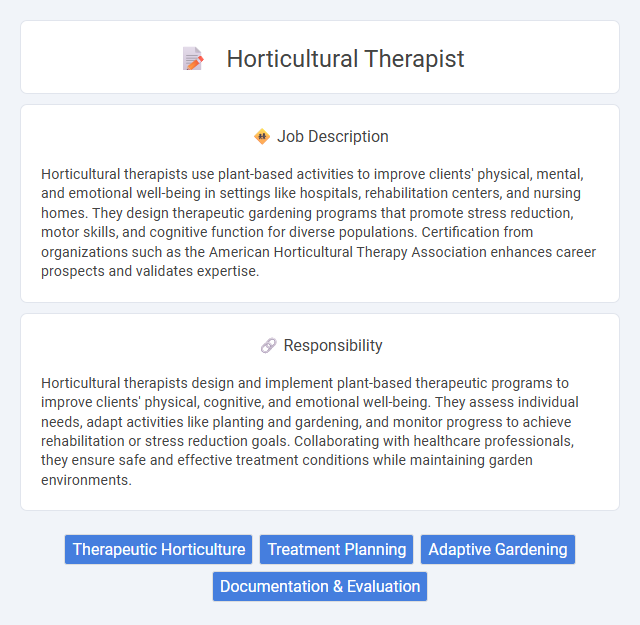
Horticultural therapists use plant-based activities to improve clients' physical, mental, and emotional well-being in settings like hospitals, rehabilitation centers, and nursing homes. They design therapeutic gardening programs that promote stress reduction, motor skills, and cognitive function for diverse populations. Certification from organizations such as the American Horticultural Therapy Association enhances career prospects and validates expertise.
Individuals with a passion for plants and a desire to support mental and physical well-being may find horticultural therapy a suitable career. Those who enjoy working in therapeutic settings and have patience for progress in clients' health are likely to thrive in this role. People with physical endurance and the ability to adapt to outdoor environments may have a higher probability of success in horticultural therapy.
Qualification
Horticultural therapists typically require a bachelor's degree in horticulture, psychology, or a related field, with many employers preferring certification from the American Horticultural Therapy Association (AHTA). Essential qualifications include knowledge of plant science, therapeutic techniques, and experience working with diverse populations in clinical or community settings. Practical skills in designing and implementing horticultural programs tailored to physical and mental health needs are critical for success in this role.
Responsibility
Horticultural therapists design and implement plant-based therapeutic programs to improve clients' physical, cognitive, and emotional well-being. They assess individual needs, adapt activities like planting and gardening, and monitor progress to achieve rehabilitation or stress reduction goals. Collaborating with healthcare professionals, they ensure safe and effective treatment conditions while maintaining garden environments.
Benefit
Horticultural therapy may offer significant mental health benefits, potentially reducing symptoms of anxiety and depression through interaction with nature. It is probable that engaging patients in gardening activities promotes physical rehabilitation and enhances motor skills. This therapeutic approach might also improve overall emotional well-being by fostering a sense of accomplishment and social connection.
Challenge
Horticultural therapists likely face challenges in adapting therapeutic activities to meet diverse client needs and abilities, requiring creativity and patience. The probability of encountering emotional or physical barriers in clients may demand specialized communication and motivational strategies. Securing funding and resources for programs frequently appears as another significant obstacle within this profession.
Career Advancement
Horticultural therapists can advance their careers by obtaining certifications such as the American Horticultural Therapy Association (AHTA) Registered Horticultural Therapist credential, which enhances professional credibility. Gaining experience in diverse settings like hospitals, rehabilitation centers, and senior living facilities increases opportunities for leadership roles and specialized programs development. Pursuing advanced degrees in horticulture, psychology, or therapeutic recreation opens pathways to research, education, and administrative positions within the field.
Key Terms
Therapeutic Horticulture
Horticultural therapists use therapeutic horticulture techniques to improve clients' physical, emotional, and cognitive well-being through gardening activities. They design and implement plant-based programs tailored to individuals with disabilities, mental health challenges, or chronic illnesses, fostering rehabilitation and stress reduction. Expertise in botany, psychology, and therapy principles is essential for creating effective therapeutic environments that promote healing and social engagement.
Treatment Planning
Horticultural therapists develop customized treatment plans that incorporate plant-based activities to improve patients' mental, physical, and emotional well-being. They assess client needs and set measurable goals to enhance motor skills, reduce stress, and promote social interaction through gardening and horticulture-related tasks. Effective treatment planning involves ongoing evaluation and adaptation to ensure therapeutic outcomes align with individual rehabilitation objectives.
Adaptive Gardening
Horticultural therapists specializing in adaptive gardening design and implement therapeutic gardening programs tailored to individuals with physical, cognitive, or emotional disabilities. They utilize adaptive tools, modified garden beds, and accessible plant varieties to promote motor skills, sensory stimulation, and mental well-being. These professionals collaborate with healthcare providers to enhance rehabilitation outcomes through personalized horticultural activities.
Documentation & Evaluation
Horticultural therapists meticulously document patient progress and therapeutic outcomes to ensure effective treatment plans and measurable improvements. Detailed records of session activities, participant responses, and environmental factors support ongoing evaluation and research. Accurate evaluation of therapeutic interventions guides modifications, enhances program efficacy, and validates the benefits of horticultural therapy within clinical and community settings.
 kuljobs.com
kuljobs.com